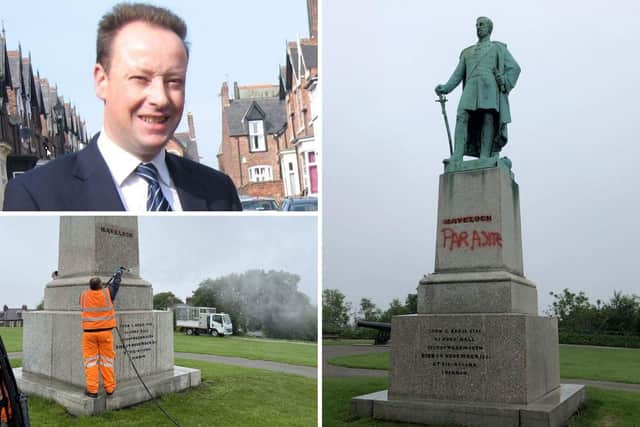'Erasing or attacking monuments denies the truth of our past' - Sunderland Conservatives leader speaks out against vandalism of Sunderland's Sir Henry Havelock statue
This article contains affiliate links. We may earn a small commission on items purchased through this article, but that does not affect our editorial judgement.
and live on Freeview channel 276
“The statue of Henry Havelock has stood on Building Hill in Mowbray Park since before any of us were born, and it should stay there – facing his birthplace at Ford – and free from the attack which regrettably we have just seen.
Advertisement
Hide AdAdvertisement
Hide Ad“By the standards of our time, Havelock’s suppression of the Indian city of Lucknow was brutal, but this statue represents the past. It does not celebrate, condone or endorse Havelock’s actions; it reminds us of them.


“It is part of the rich and varied history of our City and our country, a chapter in the telling of the story of how we got to where we are today, and takes in both the bad and the good of people and events in the past.
“Although erected in his name, the statue does not just represent one individual’s long and distinguished military service, but also pays tribute to the soldiers who served under him and stands in a city with a long military tradition.
Advertisement
Hide AdAdvertisement
Hide Ad“Havelock also occupies one of the plinths around Trafalgar Square in London which, in 2000, promoted the then-Mayor of London, Ken Livingstone, to call for the statue to be replaced by ‘more relevant figures’.
“But to erase or attack memorials of the past because they contain bad would be to deny the truth in our past, presenting a whitewashed version and opening a dispute as to who should be commemorated today.
“Oliver Cromwell, another controversial figure of the past celebrated with a statue outside Parliament, took a different view asking that his portrait be painted ‘warts and all’ referring not just to his facial defects.
Advertisement
Hide AdAdvertisement
Hide Ad“Other local figures with memorials in Sunderland have flaws too but are nonetheless celebrated as the good outweighs the bad and have not led to any complaints from local residents over the years.
“George Washington, of ancestral home and town was, by modern standards, no progressive when it came to his views on slavery, but was ahead of his time, and unique among the founding fathers, in emancipating his slaves in his will.
“To judge him by modern standards would be unfair for he recognised the threat to the national unity of his young country and trod carefully around an emotive and entrenched issue demonstrating cautious leadership.
George Hudson, the ‘railway king’ of Monkwearmouth Station fame, represented the City in Parliament and was a driving force behind the expansion of the railways but was tarnished by financial wrongdoings.
Advertisement
Hide AdAdvertisement
Hide Ad“Perhaps a line could be drawn at the worst offenders, such as slave traders whose ill-gotten gains were laundered through public works, but vandalising a public monument is never the right way to look at our past.”
:: Do you agree with Councillor Oliver’s views? Email us your thoughts to [email protected] or send us a message via Facebook